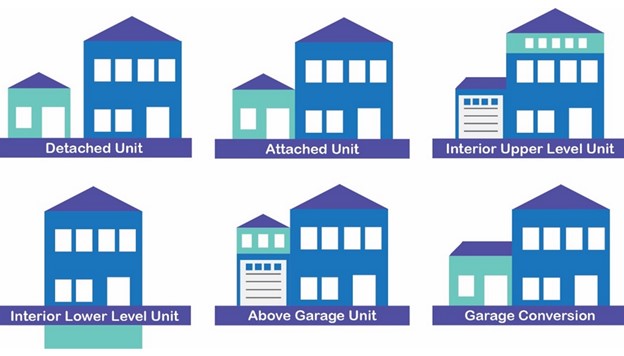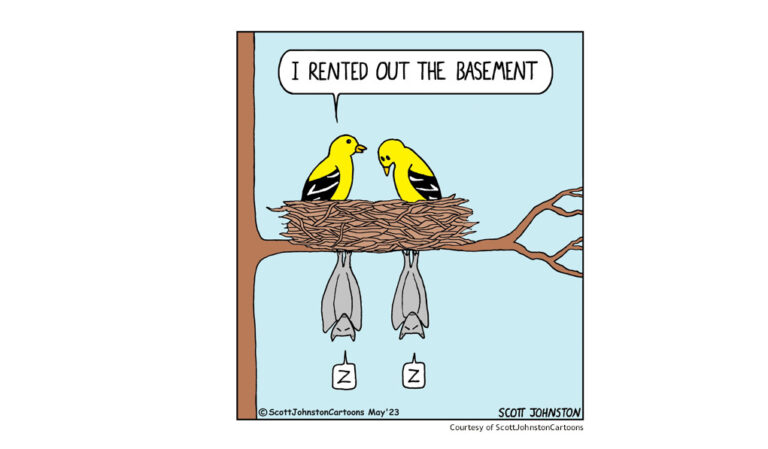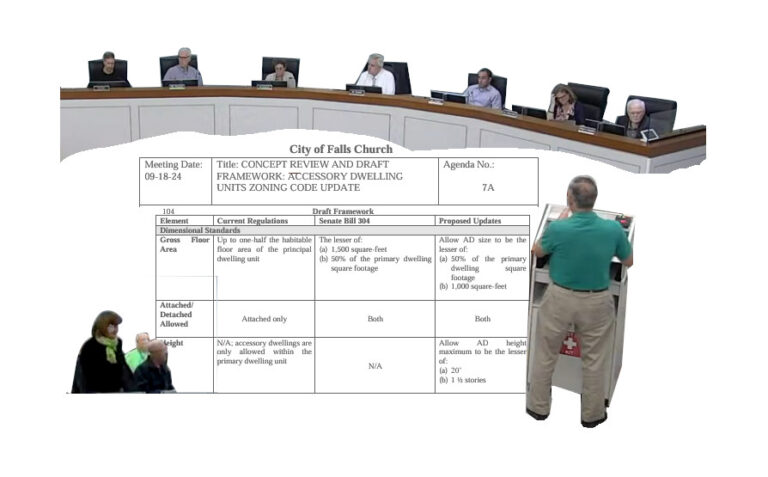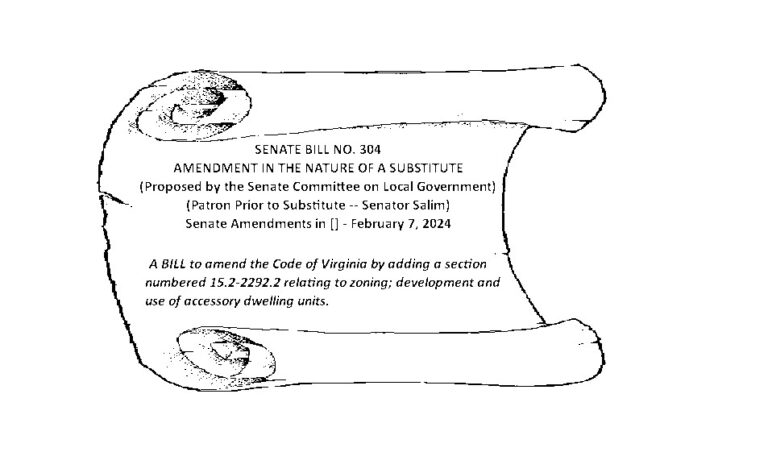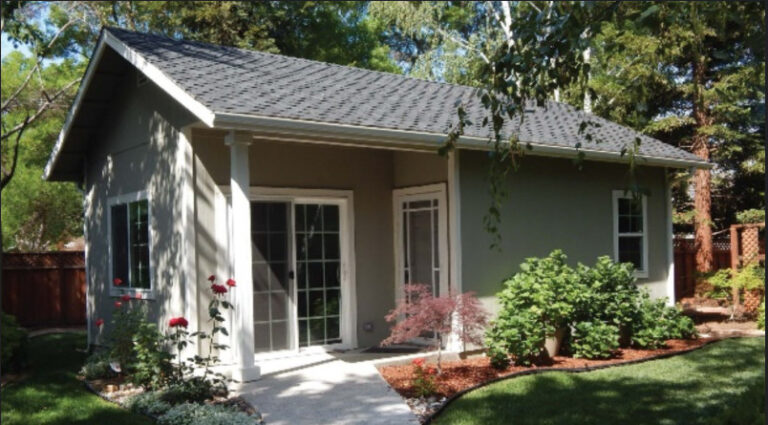City Formally Begins Discussion of Accessory Dwellings
Summary
The City of Falls Church has signaled that it wants to explore possible amendments to the City’s accessory dwelling (AD) regulations that today only permit such units within or attached to existing homes. The City Council has made updating the accessory dwelling provisions one of its 2024-2025 priorities and, with the Planning and Housing Commissions, received an initial briefing on the topic on May 20, 2024. The current schedule anticipates a final Council decision early in 2025.
VPIS meeting kicks off formal discussion of accessory dwellings
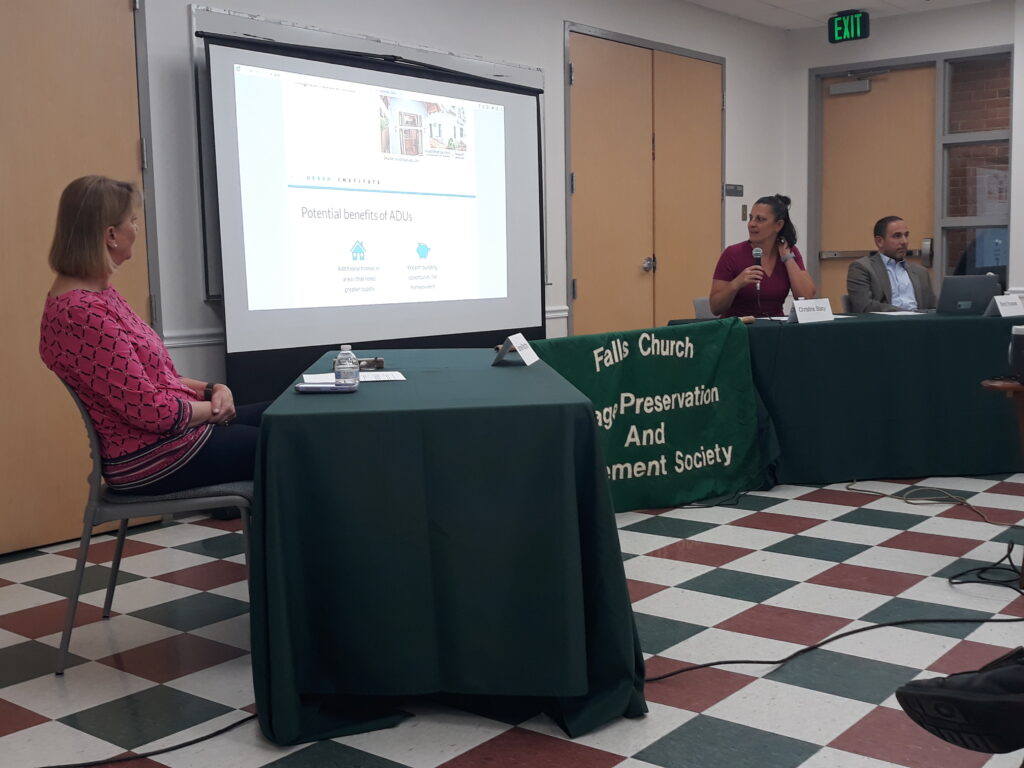
On April 16, 2024, the Village Preservation and Improvement Society (VPIS) held a community forum on accessory dwellings as part of its public education and discussion series. Key presentations were made by Christina Stacy, Principal Research Associate, Urban Institute, Washington, DC; and Brent Krasner, AICP, Urban Planner and Falls Church Planning Commissioner. Handouts for the meeting and the presentations of the two speakers are available here.
The Falls Church Pulse also published a post earlier this year that provides background on what other jurisdictions are doing in this area. [See “Accessory Dwelling Units Will Be a Key Focus of City Planning in 2024. What Are They? What Are Other Jurisdictions Doing?,” January 17, 2024.]
Joint work session
On May 20, 2024, the City Council, the Planning Commission, and the Housing Commission held a joint work session to consider objectives and next steps on possible zoning changes to encourage accessory dwelling units on residential lots within the City. According to the staff report for the work session, “City records indicate that there are currently no permitted accessory dwelling units in use in the City.” Other apartments and structures exist, but they do not meet the requirements for a dwelling unit.
Senior Planner Jack Trainor has indicated that an important part of the accessory dwelling discussion will be providing a path to compliance for existing unpermitted accessory dwellings, both attached and detached, within the City.
Council and Commission members shared a broad range of views, emphasizing the importance of first engaging the public to listen to their suggestions before drafting specific objectives or code language at the end of the summer. Several members proposed delaying specific proposals until September after additional town halls are held to assure participation from those vacationing during the summer, while also offering specific process modifications.
In response, staff have developed a new schedule for City outreach, education, and discussions leading to initial Council consideration of draft code language potentially in February 2025. The current schedule is as follows and can be found on the City’s website:
| Date | Group |
| Preliminary Workshop | |
| July 9, 2024 | Housing Commission |
| July 17, 2024 | Planning Commission |
| July 18, 2024 | Environmental Sustainability Council |
| July 23, 2024 | Community Open House/Information Session: Mary Riley Styles Public Library Downstairs Conference Room 6:30 – 8:00 PM |
| July 28, 2024 | Community Open House/Information Session: Mary Riley Styles Public Library Downstairs Conference Room 2:30 – 4:00 PM |
| Initial Term Sheet Development | |
| September 2024 | City Council |
| September 2024 | Planning Commission |
| September 2024 | Community Open House: Time & Place TBD |
| Formal Consideration | |
| November 2024 | City Council |
| December 2024 | Housing Commission |
| December 2024 | Planning Commission |
| December 2024 | Urban Forestry Commission |
| December 2024 | Environmental Sustainability Council |
| January 2025 | Community Open House: Time & Location TBD |
| January 2025 | Planning Commission Public Hearing |
| February 2025 | City Council Final Consideration |
Possible objectives for updating accessory dwellings code
City staff, in their report for the session, indicated that zoning changes to encourage accessory dwellings would enhance density and diversity within the City with minimal impact on the community or neighborhood character. This would be part of an effort to address the current housing shortage as reflected in the housing chapter of the Comprehensive Plan in order to produce more diverse and affordable housing that could serve various life stages.
Mayor Letty Hardi suggested key goals could be – in addition to helping meet the current housing crisis – aging in place, increased diversity, preservation of older homes, and equity in City regulation relative to current allowances for building “McMansions.”
Initial views
Housing Commission Member Robert Kravinsky suggested that the City should look at the potential return on investment for homeowners, with likely detached units costing some $300,000 or more. He questioned whether such units would be viable for the average home owner, or just those with relatively high incomes, emphasizing the need for affordability as well as diversity. Code changes would not likely produce many new units, Mr. Kravinsky said, and he urged staff to focus on the number of potentially eligible lots to produce a possible number of units that might be built.
Planning Commissioner Andrea Caumont urged staff to develop a one-page handout with visuals on a range of dwelling unit options.
Vice Mayor Debora Schantz-Hiscott and Council Member Marybeth Connelly focused on the importance of using several means of public communication and simplified presentations, and emphasized the potential for preservation of small houses.
Council Member David Snyder stressed evaluating the impact on infrastructure costs for the City, joined others in urging that the period for public outreach extend beyond the summer, and underscored the importance of “no undue influence” on the decision process, requesting that City staff keep a log book of their interactions with the development community and others.
Community Relations and Legislative Affairs Director Cindy Mester noted that the State Housing Commission is reviewing the proposal by State Senator Saddam Azlan Salim for possible legislation in Richmond to require communities to permit both internal and detached accessory dwellings. [See Pulse post, “Senate Bill SB 304 on Accessory Dwelling Units: How Would It Affect Falls Church?, February 24, 2024.]
Council Member Justine Underhill focused on potential sewer and school costs, the option of having preapproved design plans, and the possibility of offering incentives for housing for teachers and local workers.
Council Member Erin Flynn suggested considering the community as a partner in this review, urged using a different acronym than ADU (due to confusion with affordable dwelling units), and proposed differentiating code provisions for attached vs. detached units. She encouraged the City to conduct a survey of why citizens want or would oppose new code provisions, to not oversell potential new units as affordable or simply impose models adopted by other jurisdictions, and to be clear on what code changes might accomplish.
Ms. Flynn proposed consideration of the need for additional sidewalks, bike lanes, and bio-retention, the parcels likely to be appropriate for attached vs. detached units, and possible tax relief for preservation of older homes.
Council Member Caroline Lian encouraged staff to provide a read-out of public views prior to development of the new code language, and to consider likely new revenues for the City.
Mayor Hardi asked whether non-conforming lots could be eligible and urged efforts to hold field trips to other jurisdictions to view actual accessory dwellings and learn from them.
Resources
- City Council Meeting, May 20, 2024. YouTube video. Presentation by Senior Planner Jack Trainor and Planning Department Director Paul Stoddard and Council discussion begins at timestamp 45:02 and concludes at 1:36:40.
- City Council Meeting, May 20, 2024. This video will not display properly on a small screen as it includes the agenda.
- Staff Report titled “Briefing on Accessory Dwelling Units Update Roadmap,” May 20, 2024.
- VPIS Community Forum, “An Accessory Dwelling Unit in the Backyard?,” April 16, 2024. The presentations of the two speakers, Christina Stacy, Principal Research Associate, Urban Institute, Washington, DC; and Brent Krasner, AICP, Urban Planner and Falls Church Planning Commissioner.
- VPIS: Current Falls Church City Accessory Dwelling Unit code and a summary of what other jurisdictions are doing.
- Accessory Dwellings Update/Falls Church, VA, Official Website.

